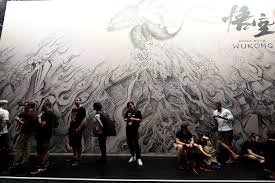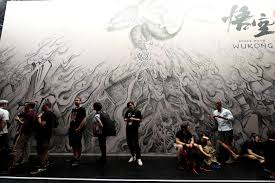
Table of Contents culture
The Rise of ‘Black Myth: Wukong
When “Black Myth: Wukong” was first announced in August 2020, the gaming community was taken by storm. The trailer showcased stunning visuals, intricate combat mechanics, and a deeply immersive world inspired by the classic Chinese novel Journey to the West.
The game’s success is particularly noteworthy given the challenges faced by Chinese game
developers on the international stage. For years, Chinese games struggled to gain traction outside the domestic market, often overshadowed by Western and Japanese titles. “Black Myth: Wukong,” however, marked a turning point
Cultural Resonance and National Pride
One of the most significant aspects of “Black Myth: Wukong” is its deep cultural resonance within China. The game’s narrative draws heavily from Journey to the West, a literary masterpiece that has shaped Chinese culture for centuries.
By bringing this iconic character to life in a medium as dynamic
and interactive as a video game, “Black Myth: Wukong” has rekindled interest in traditional Chinese literature and mythology among younger generations. This is particularly significant in a time when globalization and modernization often lead to the erosion of cultural identity. The game serves as a reminder of China’s rich cultural heritage, presenting it in a form that is both accessible and appealing to contemporary audiences.
Moreover, the game’s success has fostered a sense of national pride
. For many Chinese players, “Black Myth: Wukong” is more than just a game—it’s a symbol of China’s growing influence in the global entertainment industry. It represents a shift in the narrative, where Chinese culture is no longer seen as something exotic or niche, but as a source of inspiration and creativity that can stand toe-to-toe with the best in the world.
Cultural Preservation Through Modern Media
The importance of “Black Myth: Wukong” extends beyond its immediate success as a video game. It plays a crucial role in the preservation and promotion of Chinese culture. In an age where traditional forms of storytelling, such as literature and theater, are increasingly overshadowed by digital media, video games like “Black Myth: Wukong” offer a new way to keep cultural narratives alive.
In this way, “Black Myth: Wukong” acts as a bridge between the past and the present, ensuring that traditional stories continue to be told and appreciated by future generations. The game’s impact on cultural preservation is particularly significant given the challenges faced by many cultures in maintaining their unique identities in an increasingly homogenized world.
The Global Appeal of ‘Black Myth: Wukong’
While the cultural significance of “Black Myth: Wukong” in China is undeniable,
the game’s appeal is by no means limited to a Chinese audience. One of the key reasons for the game’s global success is its universal themes. The story of Sun Wukong’s journey is one of transformation, redemption, and the quest for self-understanding—concepts that resonate with people across cultures and backgrounds.
Furthermore, the success of “Black Myth: Wukong” has opened the door for other Chinese developers to bring their games to a global audience. The game has proven that there is a market for culturally rich, narrative-driven games that draw on non-Western traditions. This could lead to a more diverse gaming landscape, where stories from different cultures are given the platform they deserve.
Economic and Political Implications
The success of “Black Myth: Wukong” also has significant economic
and political implications. From an economic perspective, the game’s success is a testament to the growing strength of China’s gaming industry. In recent years, China has emerged as one of the largest markets for video games, both in terms of production and consumption. “Black Myth: Wukong” showcases the potential of Chinese developers to create world-class games that can compete on a global scale.
Moreover, the game’s narrative, which emphasizes themes of resilience, self-discovery, and the triumph of good over evil, aligns with the values that the Chinese government seeks to promote both domestically and internationally. In this way, “Black Myth: Wukong” can be seen as a reflection of China’s growing confidence in its cultural identity and its desire to share that identity with the world.
The Future of Chinese Gaming
The success of “Black Myth: Wukong” marks a new chapter in the history of Chinese gaming. It has demonstrated that Chinese developers can create games that are not only commercially successful but also culturally significant. This is likely to inspire a new wave of Chinese games that draw on the country’s rich history and mythology.
Looking to the future, we can expect to see more games that explore different aspects of Chinese culture, from its ancient philosophies to its modern-day challenges. These games will likely continue to blend traditional storytelling with cutting-edge technology, offering players around the world new and exciting ways to engage with Chinese culture.
Conclusion
“Black Myth: Wukong” is more than just a video game; it is a cultural phenomenon that has resonated deeply within China and around the world. By drawing on the rich traditions of Chinese mythology and literature, the game has not only provided a new way for players to engage with these stories but has also helped to preserve and promote Chinese culture on a global stage.
In the end, “Black Myth: Wukong” is a celebration of China’s cultural heritage, a symbol of national pride, and a beacon of what the future holds for Chinese gaming. It has shown the world that China is not just a consumer of global culture but a creator of it, capable of producing works that resonate with people across the globe










